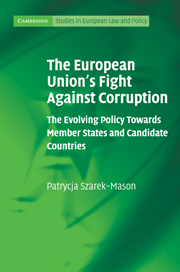 The European Union's Fight Against Corruption
The European Union's Fight Against Corruption Book contents
- Frontmatter
- Contents
- Table of cases
- Acronyms and abbreviations
- List of tables and figures
- Introduction
- 1 Corruption: concept, importance and international response
- 2 The scope of EU legal powers and development of the policy in the area of anti-corruption
- 3 The EU strategy against corruption within the Member States
- 4 Conditionality in the EU accession process
- 5 The EU's evaluation of corruption in the Central and Eastern European candidate countries
- 6 The EU anti-corruption strategy towards the Central and Eastern European candidate countries: achievement or missed opportunity?
- 7 The impact of 2004 enlargement on the EU anti-corruption policy
- 8 Conclusion
- List of interviews and consultations
- Appendix 1
- Appendix 2
- Bibliography
- Index
- CAMBRIDGE STUDIES IN EUROPEAN LAW AND POLICY
1 - Corruption: concept, importance and international response
Published online by Cambridge University Press: 03 May 2010
- Frontmatter
- Contents
- Table of cases
- Acronyms and abbreviations
- List of tables and figures
- Introduction
- 1 Corruption: concept, importance and international response
- 2 The scope of EU legal powers and development of the policy in the area of anti-corruption
- 3 The EU strategy against corruption within the Member States
- 4 Conditionality in the EU accession process
- 5 The EU's evaluation of corruption in the Central and Eastern European candidate countries
- 6 The EU anti-corruption strategy towards the Central and Eastern European candidate countries: achievement or missed opportunity?
- 7 The impact of 2004 enlargement on the EU anti-corruption policy
- 8 Conclusion
- List of interviews and consultations
- Appendix 1
- Appendix 2
- Bibliography
- Index
- CAMBRIDGE STUDIES IN EUROPEAN LAW AND POLICY
Summary
Corruption is not a new phenomenon. However, it was only in the 1990s that it first emerged as a global policy problem that could no longer be addressed purely through domestic means. In the era of globalisation, a truly international response involving major international policy players is vital to the success of anti-corruption initiatives.
The goal of this chapter is to introduce the central concept of corruption and give an overview of the major international instruments in this area. To this end, the chapter starts with a discussion of the definition of corruption adopted by the EU. It points out the strengths and weaknesses of this definition and compares it with definitions adopted by other international organisations. Following this discussion, the chapter moves on to analyse the prevalence, causes and consequences of corruption in the CEE candidate countries.
EU policy within the 2004 accession process was based on the perception that corruption in the CEE candidate countries was more widespread than in the Member States. This chapter examines this claim by presenting evidence of corruption within the CEE countries before the accession. In addition, the chapter discusses why the heritage of communism and the nature of political and economic transitions made the CEE countries particularly vulnerable to corruption.
Beyond this, the chapter goes on to look at the emergence of international cooperation against corruption in the 1990s and explains why corruption became an international policy problem. Furthermore, the chapter also shows the evolution of international cooperation, surveys the major multilateral initiatives against corruption, and discusses how international organisations can help in preventing and combating corruption across countries.
- Type
- Chapter
- Information
- The European Union's Fight Against CorruptionThe Evolving Policy Towards Member States and Candidate Countries, pp. 5 - 42Publisher: Cambridge University PressPrint publication year: 2010


